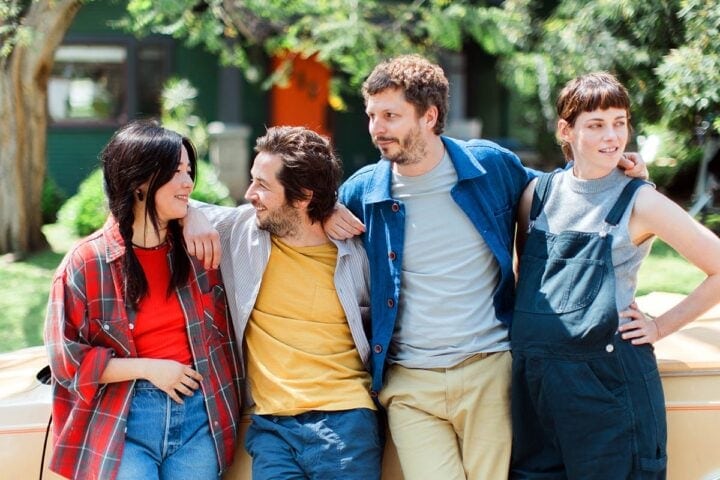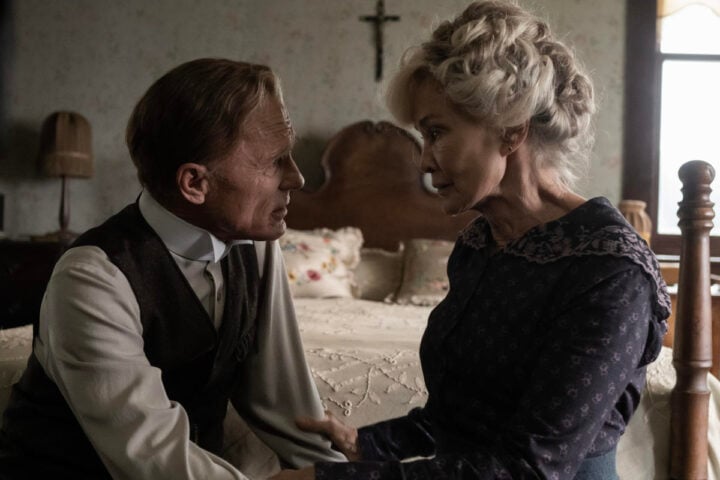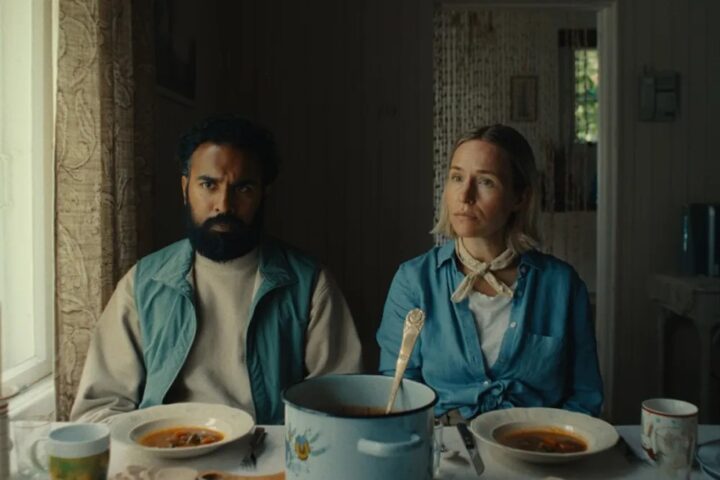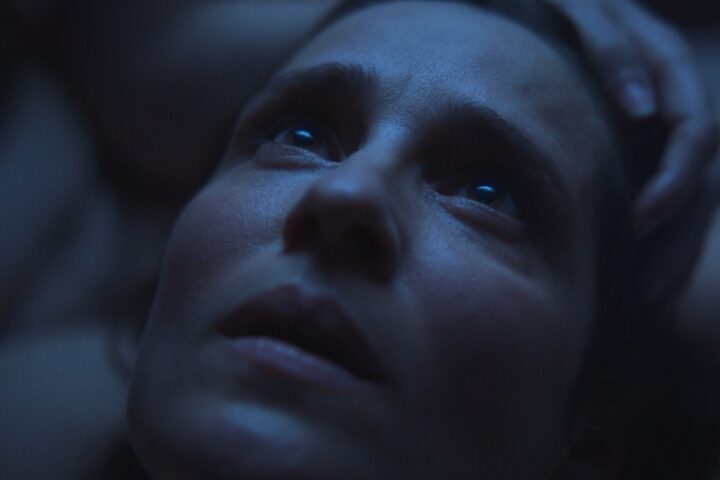Maximalist horror-comedy has become such a mainstay of 21st-century indie cinema that a late-’80s-set lesbian romance that uses schlocky gore tinged with meta humor to figuratively explore the tumult of new love is hardly as outré as it would have seemed a decade ago. Rose Glass’s Love Lies Bleeding, with its hyper-saturated, giallo-evoking cinematography and lapses into fantastical imagery, freely plays with the boundaries of realism. This hyper-stylization, accompanied by a steady score of growling synths, packs some punches, but that isn’t to say that we can’t see a fair portion of them coming.
The small but tough Lou (Kristen Stewart) appears to be one of only two workers at a grimy gym, Crater’s, in middle-of-nowhere America. We meet her as she’s digging through vomit that’s clogged the gym’s toilet, a seemingly common occurrence at this sweaty den of muscled men, which has slogans posted on the wall (“Pain is weakness leaving the body”) that one can’t help but read to oneself in Arnold Schwarzenegger’s voice. We’re introduced to this space with a kind of ironic enthusiasm, the blaring music on the soundtrack and close-ups on veiny biceps effectively camping the Schwarzeneggerian ethos of bulking up as self-actualization.
Lou doesn’t appear to have any problems with her clientele, but the threat of male violence hangs in the air throughout. Lou’s sister, Beth (Jena Malone), is married to a serial abuser, JJ (Dave Franco). Beth spends enough time bruised up that Lou doesn’t even comment on the marks on her sister’s face the first time we see Lou visit her at home. Beth refuses to press charges, no doubt because JJ is in deep with the family: He works at the shooting range run by Lou and Beth’s local bigwig father (Ed Harris). Lou Sr. is bad news, as the shooting range is a front for his gun-running business and, as the film’s expressionistic, red-bathed flashbacks imply, the younger Lou has witnessed him dispatching potential informants in his circle.
Into this volatile mix wanders Jackie (Katy O’Brien), an Oklahoman runaway making her way to Vegas to realize her dream of winning a national bodybuilding championship. It’s love at first lift after Lou catches sight of Jackie’s impressive lats and sculpted arms—as well as her confidence among the gym’s imposing male clientele. A passionate, whirlwind romance begins between them, with Jackie moving in with Lou the day after their first, ecstatic sexual encounter, before then being pulled into an illicit world of guns, violence, and human growth hormones.

Lou and Jackie’s love is clearly based in little more than shared desperation, and after a certain point it consists largely of fervid declarations of said love, but Stewart and O’Brien are both vividly compelling as down-on-their-luck wastrels clinging to each other, and to Jackie’s dream of bodybuilding stardom, in an incredibly seedy and hostile world. There’s an undeniably propulsive energy to Love Lies Bleeding, in the way it continually ratchets up tension—even in the sex scenes—and accentuates moments of intensity with subjective, almost magical-realist flourishes. Visually and aurally, it’s easy to get almost as caught up in this world as Jackie does.
But at a certain point you may wonder whether the film’s sound and image, with their assertive garishness, aren’t pulling too much of the weight by themselves. By the end, the story can’t quite keep up with the style: Throughout, we’re promised that something terrible and unspeakable lies at the bottom of a ravine outside town, but when we’re brought there via an explosive event, it’s actually a bit of a fizzle. Jackie’s growing ‘roid rage is overexploited as a plot device, and the turns she takes seem motivated more by the need to serve a theme than by character.
Many of Love Lies Bleeding’s maneuvers also feel overly familiar. The percolating charge of energy reflected in the saturated colors and ’80s synth riffs recalls the work of the Safdie brothers. A hallucinatory bodybuilding show suggests an intentional gender-flipped riff on Elijah Bynum’s Magazine Dreams. And, of course, it’s difficult not to see the film, with its themes of freedom and rebellion in the context of a story about women fleeing all sorts of trauma, as being in conversation with Ridley Scott’s Thelma & Louise.
Crucially, of course, in Love Lies Bleeding the rebel pair is actually a couple. And the queerness of Glass’s film, the way it confronts the abject ugliness of the world, even of its main characters, with an outsized performance of joy in love and sex, may be the most important distinction between it and all the films it seems to be drawing from. In the end, it’s a memorably girthy, if not evenly proportioned, ode to the treacherousness but ultimate value of romantic love.
Since 2001, we've brought you uncompromising, candid takes on the world of film, music, television, video games, theater, and more. Independently owned and operated publications like Slant have been hit hard in recent years, but we’re committed to keeping our content free and accessible—meaning no paywalls or fees.
If you like what we do, please consider subscribing to our Patreon or making a donation.





